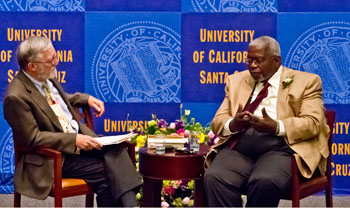On Friday night, when emeritus writing lecturer Don Rothman and Oakes College founding provost J. Herman Blake sat down to talk about the transformative power of education, they made that 40 years of UCSC history feel intimate, personal and immediate.
For an hour and a half, they turned the Humanities Lecture Hall into a living room—and an audience of nearly 200 people tuned in to their conversation.
Their talk, entitled “Rediscover: J. Herman Blake and Donald Rothman,” covered the importance of empathy, and the enduring multi-cultural vision that guided the creation and growth of Oakes.
These two old friends and former colleagues also spoke of the importance of “listening eloquently.”
Blake is often credited for his role in shaping the values and the strong multi-ethnic cross-disciplinary focus of Oakes College, and hailed for his classroom style, which is strongly rooted in Civil Rights history and old-fashioned storytelling prowess.
But he was quick to credit other people for influencing and guiding him along the way, naming such luminaries as Oakes co-founder Rafael Guzman, and Civil Rights leader Septima Clark, who mentored Blake and spent time at Oakes College.
Blake also spoke of historic forebears whose example offered comfort and encouragement in difficult times. To this day, Blake, who grew up in a poor family, makes sure to wear a fresh rose every time he lectures in a classroom. The flowers are worn in honor of George Washington Carver, a former slave who went on to be a groundbreaking botanist and scientist.
As a boy, Carver was traded by his slave owners in exchange for a horse—a fact that astounded Blake, especially considering Carver’s later fame and influence. “You cannot walk in the shadow of George Washington Carver and say something’s too hard.”
Blake said Carver was among the people who made him realize that human beings are not intended to lay their burdens on others. “You try to heal the burden on someone else and tote it together.”
During the presentation, several people in the audience were reduced to tears when speaking of the way Blake influenced and in some cases transformed their lives.
Frances Henderson, (Oakes, ’80, East Asian Studies/history) recalled how Blake made her promise to return to school at UCSC after she took a quarter off, in part because her father was ill. “Someone saw me crying, and he found out about it. He was very caring. As a provost he wore a mantel of power but he was very sweet and gentle.”
Another former student, Gregory Brown, now a professor of criminal justice at Cal State Fullerton, remembers some wise words from Rothman many years ago: “He said the best writers are rewriters.” Rothman also told his classes that college students should aspire to write like themselves, finding their own voice instead of trying to mimic the voice of academia, Brown recalled.
While introducing Blake and Rothman, UCSC Chancellor George Blumenthal—a founding faculty member at Oakes College remembered meeting both of them more than 40 years ago.
He praised Rothman’s ability to work well with different groups and his commitment to students, and credited Blake with a strong vision “and a will to do something different.”
“Both (Rothman and Blake) were crucial to the development of Oakes,” Blumenthal told the crowd. “Herman’s commitment was always to the students. He wanted a place where they could feel safe and comfortable and revel in their differences rather than demand similarities.”
But Blake also realized that something “more than comfort” was at stake, said Blumenthal, referring to Blake’s strong commitment to the teaching of sciences at Oakes.
The dialogue left a deep impression on Rothman.
“I witnessed the expression of more optimism, passion for education, and gratitude than I have ever seen on this campus or anywhere, for that matter,” Rothman said. “And I came away believing that our current students need even more opportunities to learn what is possible for them, even in a time of terrible economic retrenchment. This weekend, UCSC, and especially Oakes College on its 40 anniversary, revealed themselves to be centers of hopefulness and great antidotes to cynicism, which great universities should be.”



